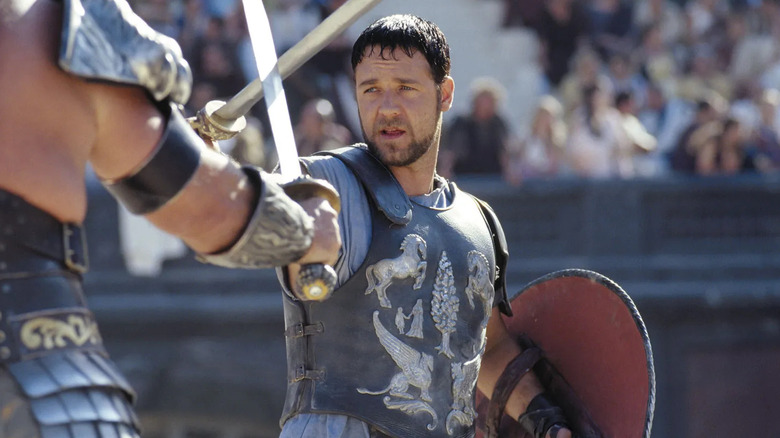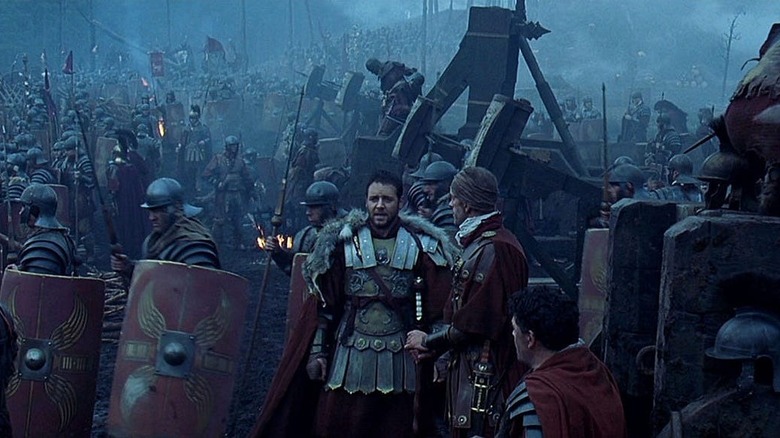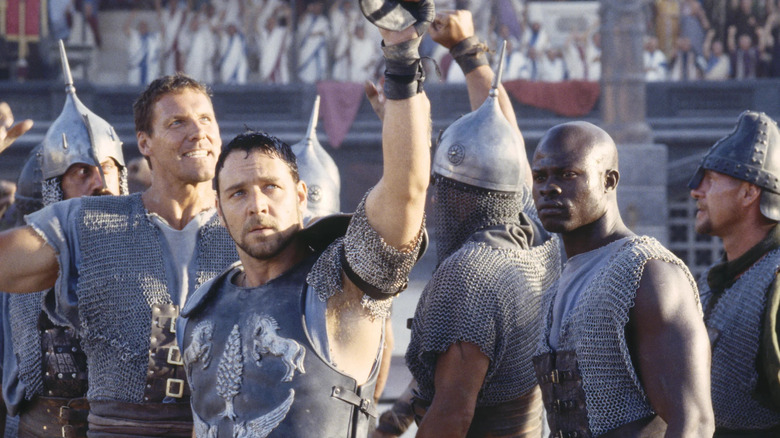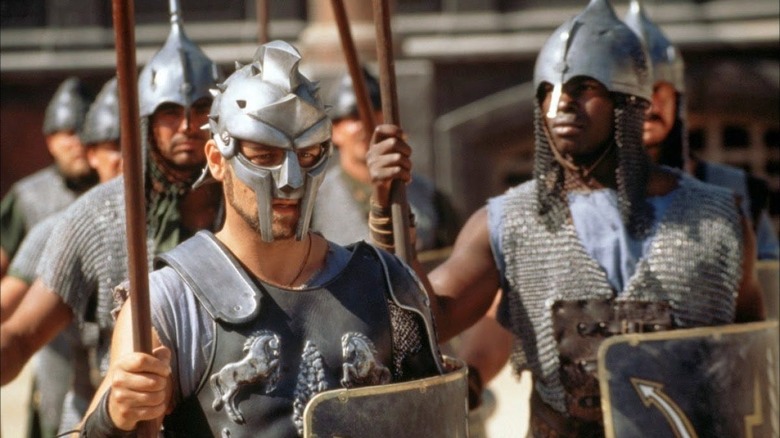Was Gladiator's Maximus A Real Person?
"Gladiator" is director Ridley Scott's famous action flick that showcases the life of the Roman hero Maximus (Russell Crowe). Over the course of the film, the celebrated general falls from the heights of military glory, loses his beloved family, is sold into slavery, and then rises through the ranks of gladiatorial legend to eventually gain revenge and restore the Roman Republic. It's a feel-good epic for the ages — and one that is absolutely riddled with historical errors, starting with its central figure.
Maximus Decimus Meridius is not a real person. Russell Crowe's character is fictitious on every level. There, we did it, just like pulling off a band-aid.
It's true; Maximus' entire inspiring story (as a whole) is made up to add depth, drama, and momentum to the "Gladiator" narrative. However, before you write off the entire experience as a fraud, it's worth pointing something out. There are many pieces of "Gladiator" that are actually quite true, including bits involving Crowe's titular character. Maximus appears to be a conglomeration of several different ancient Roman individuals, and while none of these have been formally put on record (from what we can tell), there are plenty of potential sources for inspiration. Some of these are obvious pop-culture connections. For instance, there's everyone's favorite rebellious gladiator, Spartacus — a freedom fighter with a vendetta to overthrow the Roman state, he had to be an inspiration for the "Gladiator" lead role, even if it was just a subconscious factor.
But that's not all. There are also many less well-known Romans who are eerily similar to Maximus in one way or another. Let's peel back the curtain on some of these potential inspirations and take a look at how each of them may have contributed to Scott's masterpiece.
Two popular candidates are Macrinus and Cassius
These first two candidates are the most popular names put forward as contenders for the Maximus persona. The first is Marcus Nonius Macrinus, a statesman who lived during the latter days of the Pax Romana — a two-century period when there was relative peace throughout the Roman Empire and a time that ended with the turbulent reign of Marcus Aurelius. Macrinus was one of Aurelius' generals and advisors. He enjoyed the emperor's approval and appears to have been liked and well-known by him.
Where the comparison goes south is the fact that Macrinus lived a full and successful life in Roman politics. He was rich and influential and buried in a tomb, and he never faced off against Commodus (Joaquin Phoenix) or lost his family. Nevertheless, when the general's burial plot was discovered in 2008, it was not only reported as a massive and impressive grave site, but also as the final resting place of the man who at least partially inspired the "Gladiator" protagonist.
Alongside Macrinus, we have Avidius Cassius, another of Marcus Aurelius' generals who eventually rose to be the supreme commander of Roman forces in the East (the Romans had a ton of armies scattered across endless geopolitical borders at this point in time). One of the biggest similarities between Cassius and Maximus is that both attempted to declare themselves as the big man in Rome. However, the fallout was very different.
In Maximus' case, Commodus retains control and tries to execute the seemingly rogue general. In contrast, the real-life Cassius declared himself emperor when an incorrect rumor of Aurelius' death made the rounds. The unstable bid for power ended when the man was beheaded not by Commodus or Aurelius but by his own soldiers.
Other influences (including one less common — but obvious — candidate)
While Macrinus and Cassius are often put forward as inspiration for the fictional Maximus, one individual who deserves much more attention is Tiberius Claudius Pompeianus. The similarities between Pompeianus and Crowe's characters abound. Like Maximus, Pompeianus played a key role as a leader in the Marcomannic Wars (the years-long fight against German barbarians). He also married the Emperor's daughter, Lucilla, becoming Marcus Aurelius' son-in-law.
From there, Pompeianus continued to lead Roman armies and was lined up by Aurelius not to replace Commodus as heir but to serve as his advisor. However, when his wife became entangled in a plot to take down her brother (sound familiar?), he retired from public life on the impeccable excuse of having poor eyesight. Even so, the man was physically present in Rome when Commodus died and continued to be involved in Roman politics after the fact. He was even offered the crown after Commodus perished, and again at a later point.
Magnus Maximus is another inspiration point. Maximus doesn't just share a title with Crowe's titular character; he's also a Spaniard who comes from humble origins and eventually is proclaimed an emperor much later in Roman history. And then there's Marcus Valerius Maximianus, another Roman hero who shares at least a similar name to the made-up Maximus and who also made his mark during the Marcomannic Wars.
Some have even gone so far as to consider the famed Roman Emperor Diocletian as a source of inspiration. Diocletian became the emperor's bodyguard, general, and then heir before ascending to the Purple himself. As Emperor, Diocletian instituted sweeping reforms that, while they didn't restore the Republic, were definitely revolutionary and came after an extended era of chaos and destruction.
Maximus' character is based on other historical elements as well
There are many other historical facts that appear to have influenced the Maximus character. One of these is the fact that Commodus is infamous for fighting crippled opponents, amputees, and wounded soldiers in the arena. He was a bully of a-man who loved to brutalize others while ensuring he was safe and able to win every time. This resonates with his willingness to stab Maximus before their final fight.
Even so, historically, Commodus wasn't actually killed fighting in the arena. Instead, he's strangled to death by his wrestling partner, Narcissus, who is urged by plotting senators to assassinate him. Once again, this echoes the story of Commodus' old friend, Maximus, killing him in an athletic competition in the film.
Maximus' Stoic nature is also reflective of historical fact. He is a loyal follower of Marcus Aurelius, who himself famously practiced Stoicism and was the author of the still-popular book "Meditations." Of course, Stoics didn't tend to believe in an afterlife, so that part had to be fudged a bit, but the connection still stands.
Finally, there's the already-alluded-to element of Lucilla (Connie Nielsen). In Scott's film, Commodus' sister is portrayed as an accurate but stereotypical iteration of the female influence on Roman politics. At different times in her life, the historical sister of Commodus was a daughter, wife, and sister to an emperor. She also actually conspired with senators to kill her brother and failed, at which point Commodus executed her. She married one of her father's generals and had a son named Lucius Verus, all of which were integrated into Maximus' backstory in the movie. While Maximus may not be real, there is no doubt that Scott and company did their homework when creating the character.



